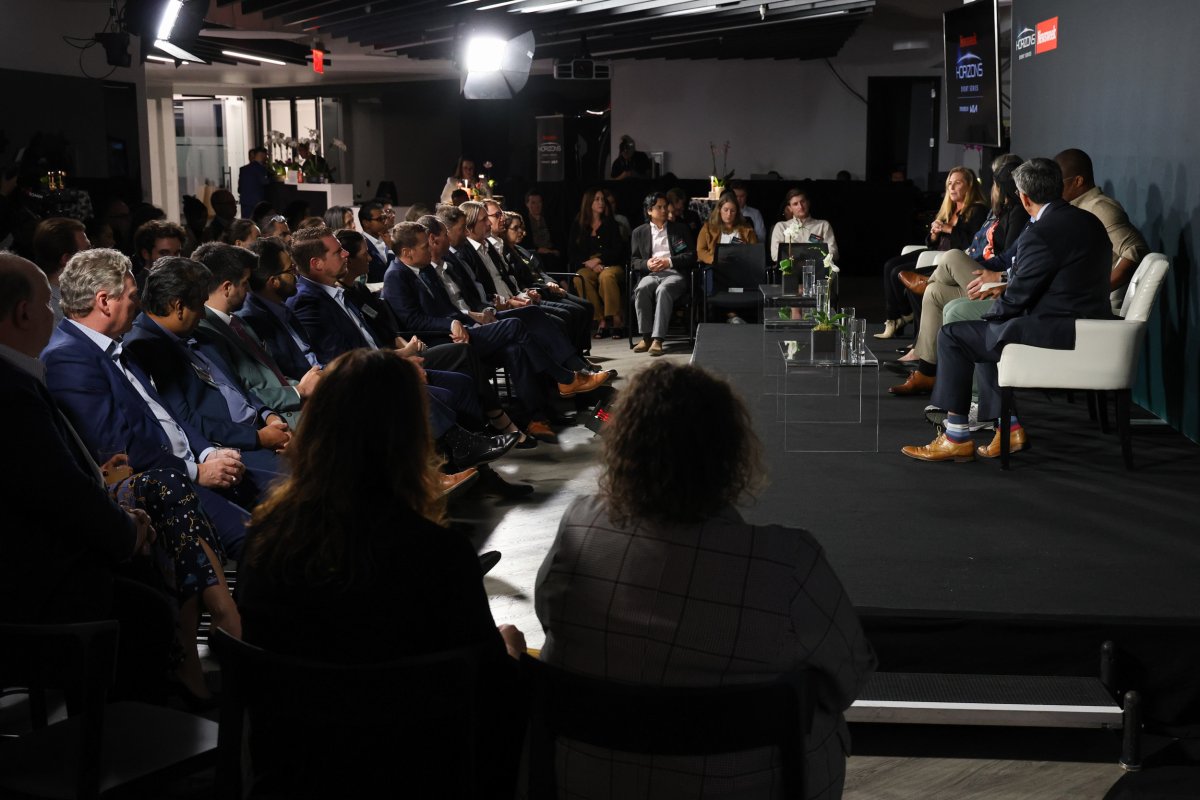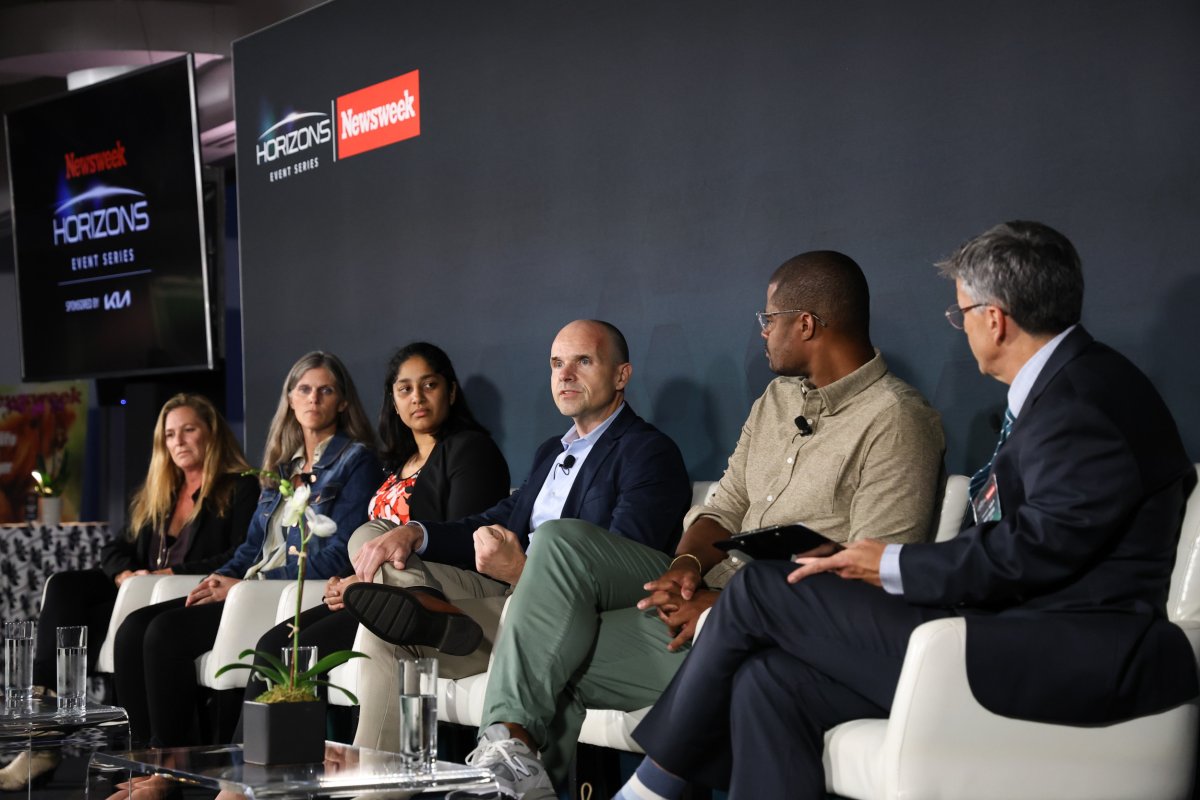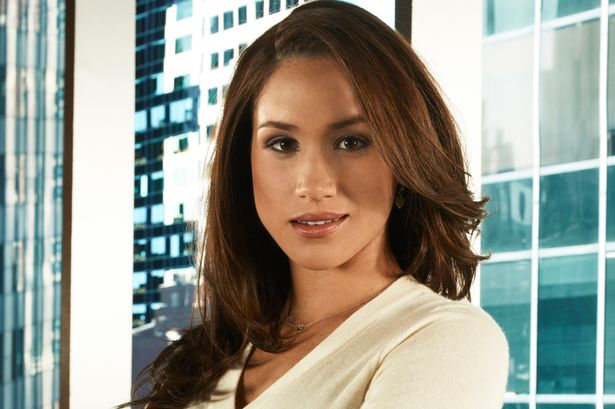AI Expert Says Tech Could Be a Hero ‘If We’re Serious’ About Climate Action
The rise of artificial intelligence promises advancements in clean energy by offering new ways to lower emissions and adjust to climate impacts. But the computing power needed to operate generative AI is itself a massive energy consumer.
To discuss this complex relationship between AI and the climate, leading experts from technology and energy companies came together at an event at Newsweek headquarters to have a conversation about whether AI is a climate hero or villain.
Part of Newsweek‘s new Horizons event series, the panel discussion took place on Wednesday, September 25, in the middle of Climate Week in New York City. The panel featured five participants and was moderated by Newsweek‘s Environmental and Sustainability Editor Jeff Young.
Panelists included Microsoft Vice President of Energy Bobby Hollis; Bezos Earth Fund Director of AI and Data Strategies Amen Ra Mashariki; Salesforce Executive Vice President & Chief Impact Officer Suzanne DiBianca; Duke Energy Managing Director, ESG & Sustainability Heather Quinley; and MIT assistant professor Priya Donti.
Yekaterina Gyadu
Their conversation explored how the benefits provided by AI-assisted breakthroughs could negate the related power demands needed to generate them.
The topic is gaining in importance every day—the California-based Electric Power Research Institute (EPRI) released a study in May showing that data center power usage could eat up to 9 percent of U.S. electricity generation by 2030. That figure is more than double the amount currently used.
Last month, the White House expressed optimism that the country would be able to meet the energy needs related to AI.
“The explosive growth of AI is posing this big question: Are we going to have enough energy to power AI?” Energy Secretary Jennifer Granholm told reporters in a briefing on Friday, August 9. “We emphatically say yes, we will.”

Yekaterina Gyadu
That optimism was shared by Hollis, who said AI was “definitely a hero” in regard to its relationship to climate change.
Hollis, who has led Microsoft’s global energy team since 2023 and also held energy-related positions at Meta and Apple, told the audience at Newsweek that “when you look at wildfire mitigation, when you look at storm impact, when you look at the things that really are going to impact every human being on this planet, that’s where you see AI as a tool that literally can save lives.”
Microsoft’s clean-energy ambitions have been complicated by AI. In May, a Microsoft sustainability report showed that the company’s aggregate emissions for 2023 were up 29 percent compared to 2020—a fact that it says is largely due to the expansion of data centers powering generative AI.
Just last week, Microsoft entered into an agreement with electric utility company Constellation to provide its data centers with nuclear power, a move that may lead to Pennsylvania’s Three Mile Island being restarted.
“Our entire portfolio of AI has accelerated and increased the need for carbon-free energy, so that requires us to look outside the box, and that box for us means looking at some of the technologies that have been there for a long period of time,” Hollis said when asked about potentially restarting a Three Mile Island reactor, now called the Crane Clean Energy Center. “It’s a Pennsylvania energy resource that ran through 2019, had an incredible operation record and had the ability to deliver carbon free energy.”

Yekaterina Gyadu
In his position at Bezos Earth Fund, Mashariki helps groups use data to solve complex environmental issues. Talking about how his organization came to have a focus on AI, he said, “We didn’t want to fund AI work. We wanted to actually fund climate and nature work.”
Mashariki shared a crowd-pleasing example about AI is helping assist in the removal of invasive pythons from the Florida Everglades. The process of removing the animals drives home a larger point about how to use AI to increase impact.
“You’ll hear a lot of people do projects that say we’ll use satellite imagery and AI deep learning to identify where the pythons are. But for us? We’re far less interested in understanding where the pythons are. But more interested in understanding where they are such that we can facilitate the organizations that would normally go in [to remove them],” he explained. “We’re not interested in understanding where things are and measuring things anymore. We’re more interested in measuring and monitoring for driving impact.”
DiBianca leads Salesforce’s stakeholder capitalism strategy, which includes the company’s global corporate relations, sustainability and ESG strategy. She said, “We are building LLMs. But what our mantra is, is you don’t need to know how to write poetry to solve an issue in health care. So the models that you’re seeing today are massive models. They’re requiring a lot of compute power, and you don’t always need that much.”
Salesforce recently surveyed nearly 500 sustainability professionals on their views regarding AI and found that while 40 percent were worried about AI’s impact on their company’s sustainability efforts, 60 percent expressed optimism that AI’s benefits would counteract those negative effects.
DiBianca, who called AI a hero “100 percent,” added that “what I don’t want to have happen is the next digital divide, where educators, public schools, nonprofits don’t have access to this technology, so we’re doing a lot of work in this area.”

Yekaterina Gyadu
At Duke Energy, one of the largest energy holding companies in the U.S., Quinley’s team sets ESG strategy. She saw AI as a “little bit of both” a hero and a villain.
“We’ve been using AI, leveraging its capabilities since 2017, and it helps make us more efficient,” Quinley said. “We’ve been using it for leak detection and faulty meters, energy theft, all the way to plant maintenance and storm detection and outage maintenance. So it’s benefited us, it’s benefited our customers.”
Quinley, though, also talked about the increased energy demands stemming from the growth in AI.
“What we’re seeing is our customers are experiencing significant load growth,” she explained. “We’re seeing significant load growth from data centers and advanced manufacturing. As we flagged for data centers in the next few years, they will account for 25 percent of our new projects, and advanced manufacturing—EVs, batteries, semiconductors, etc.—will account for about two-thirds.”
1 of 5

Yekaterina Gyadu
MIT’s Donti, who is also co-founder and chair of the research group Climate Change AI, gave a response on how AI itself is not yet a hero or villain regarding its impact on the environment.
“AI isn’t the agent in this equation. People and organizations are. AI is an accelerator of what we do across society,” she told the audience. “If we’re serious about fighting climate change, it will be a hero. If we’re not, it’s going to be a villain.”
Researchers, including Donti at Wednesday night’s discussion, have said more transparency is needed from tech companies to fully study the issue of how much energy AI models are using. Legislation from Massachusetts Senator Ed Markey now pending in Congress calls for additional disclosure.
“I think that part of the reason the beast seems so scary is because the nature of the beast is, I think, not necessarily yet that well known,” Donti said. “These kinds of dynamics are actually really hard to understand if you don’t have transparent access to to data about the uses and then it means that you don’t know what to do. … I think further transparency and data sharing from multiple entities on these kinds of things are going to be really instrumental.”
Stay tuned for more Newsweek Horizons events taking place later this year.







![Eguavoen Drops Victor Osimhen From Super Eagles Vs Libya Squad [Full List]](https://trendburst.com.ng/wp-content/uploads/2024/10/Eguavoen-Drops-Victor-Osimhen-From-Super-Eagles-Vs-Libya-Squad.jpeg)
